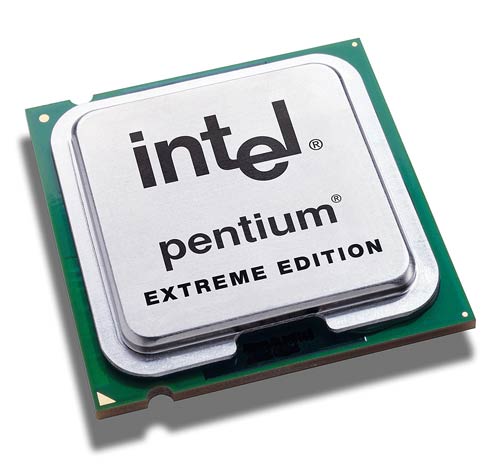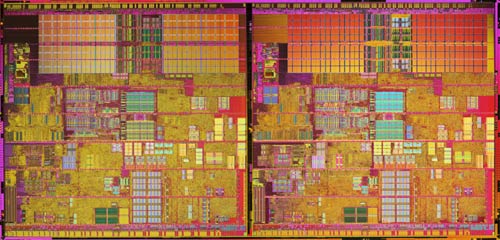Intel Dual Core Performance Preview Part I: First Encounter
by Anand Lal Shimpi on April 4, 2005 2:44 PM EST- Posted in
- CPUs
The Chip: Pentium Extreme Edition
As we mentioned in our IDF coverage, Intel has dropped the number 4 from their naming for their dual core parts. The new dual core desktop CPUs will simply be called the Pentium D and the Pentium Extreme Edition.

Both the Pentium D and Pentium Extreme Edition are nothing more than two 90nm Prescott 1M dies glued together. That means that each core has its own 1MB L2 cache, and that also means that architecturally, these chips are no different than the single core Pentium 4s that are out today - other than the obvious dual core fact.

Contrary to what we've reported earlier, the only difference between the Pentium D and the Pentium Extreme Edition is the presence of Hyper Threading; mainly, the Pentium D doesn't have it, while the Extreme Edition does. Both chips will only use a 800MHz FSB, they both have the same cache sizes, and they only differ in the presence of HT.
Armed with Hyper Threading, the Pentium Extreme Edition allows the execution of 4 concurrent threads and appears as a quad processor CPU to the OS. Without Hyper Threading, the Pentium D only allows for 2 concurrent threads and appears as a dual processor CPU to the OS.
While the Pentium D will be offered in three speed grades, from 2.8GHz up to 3.2GHz, the Extreme Edition will only be launched at 3.2GHz. Note that the fastest single core Pentium 4s run between 3.6GHz and 3.8GHz, so there is a significant clock speed penalty paid by going to dual core.










141 Comments
View All Comments
sharikou - Tuesday, April 5, 2005 - link
granted, this annand review was only part one, but hexus.net had done it much better in just one set of benches. From reading hexus.net's review, one can clearly see the advantages and limitations of INTEL's two-cpu-in-one-package device, basically, the intel chip are two cpus, so it can do two heavy duty things at the same time, but if you try to do 1 thing at a time, the new chip is slower, or if you do 3 things at the same time, the same slowness will occur.So your benchmarks are just designed to fit the new INTEL dual-CPU, doing two things, instead of one or three at the same time.
One suggestion I have is to do some comparison with a 2P Opteron workstation, we know AMD will release dual core Opterons soon, and using a SUN or BOXX opteron workstation, you can have 4 cores, it will be interesting to see how these 4 cores will perform.
We know INTEL won't be able to release 2P dual-chips until 2006. AMD forced INTEL to rush to dual chip.
Hans Maulwurf - Tuesday, April 5, 2005 - link
Well, I think I have to open my mind for dual core.But maybe you understand my fears about multitasking benchmarks. One could make many different benchmarks performing different on different platforms and chose one to put in his review. This looks a bit arbitrarily.
If someone benches games, for example, everybody will be curious if there is no Q3, D3 or UT. So the reader knows if a common(realistic) scenario is choosen for benching. Thsi is almost impossible for multitasking, I think.
I´m really interested in power consumption. Hexus writes there is only a slight increase in TDP, and no voltage drop. It will be interisting to see how this is possible as most parts of the CPU are doubled and I´ve not heard anything about different manufacturing techniques used for DC.
sharikou - Tuesday, April 5, 2005 - link
This is one of the worst reviews, worse than Toms' and worse than the AnndTech Athlon64 3500 vs Xeon 3.6GHZ review.1) What's the hardware setup?
2) why weren't there any game reviews if you are using $600 video cards?
3) why isn't there any power consumption figures?
INTEL's dual core isn't really dual-core, it's just two CPUs stick together, the two cpus share the same bus, without any logic in between. performance-wise, it should be the same as two xeon 3.2GHZ, and we know from Toms benchmark, a single Opteron 244 beats 2P xeon 3.2 in real applications.
lopri - Tuesday, April 5, 2005 - link
This is an impressive piece of work. No wonder AT is #1! Refreshingly different but more real-world-like benchmark.SignalPST - Tuesday, April 5, 2005 - link
Question:If you were to force a game to run using the second core, and only that game on the second core, and leaving the rest of the system overhead to the first core, wouldn't that provide a smoother and faster performance compared with the identical clocked single-core CPU?
JustAnAverageGuy - Tuesday, April 5, 2005 - link
Page 12."For this test, we used DVD Shrink, one of the simplest applications available to compress and re-encode a DVD to fit on a single 4.5GB disc."
Shouldn't that be 4.7GB?
Distributed Computing programs would be a good idea!
michael2k - Tuesday, April 5, 2005 - link
#51: Well, for people who would/SHOULD buy a dual core system, those are realistic scenarios. For those who game, or don't do those tasks, you won't see any performance benefits*#52: They were thinking, "The performance of the dual-core is more or less the same as the equivalent single-core CPU, so let's not be redundant and test dual-core CPUs where single-core CPUs are more cost effective**
*Performance in games will increase when they effectively do two things at once of roughly equal importance. For example:
ChessQuake, where one CPU deals with graphics, physics, sound, and AI, while the other CPU plays a game of chess
DVDooM, where one CPU draws the brightest and darkest blacks anyone has ever seen, while the other CPU is encoding it to DVD for posterity
As long as sound and light reflects geometry, you can't separate sound and rendering from interaction. Dual CPUs would be useful if you have two keyboards, two mice, and two displays for a two player game of DooM3 on a single computer.
**See the single core equivalent reviews. AnandTech as done them.
kmmatney - Tuesday, April 5, 2005 - link
misspell:Will Dual-Core work in Windows 2000? I don't see why not. I'd like to see a comparison between hyper-threading versus dual core in Win2K...I've heard that hyperthreading support is crippled in Win2K, but perhaps dual-core will work normally.
kmmatney - Tuesday, April 5, 2005 - link
Will Dual-Core work in Windows 2000? I don't see why not. I'd like to see a comparison between hyper-threading a dual core in Win2K...I've heard that hyperthreading support is crippled in Win2K, but perhaps dual-core will work normally.Natronomonas - Tuesday, April 5, 2005 - link
With two top-notch gaming CPUs (EE, FX), even if they do say the performance of the dual-core is more or less the same as the equivalent single-core CPU, it is disappointing not to see even a single gaming benchmark.What were they thinking??